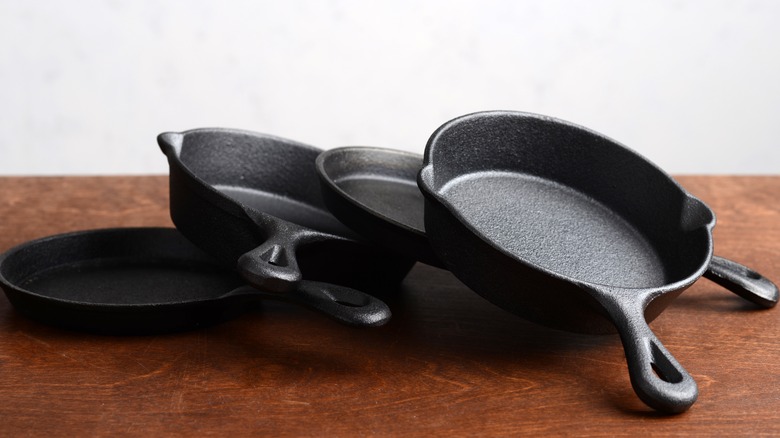You Need To Stop Making Pasta In Your Cast Iron Skillet
We've all heard the saying "if it's not broken, don't fix it." Likewise, there are plenty of awesome things in the food world that got it right the first time and hasn't had to change much at all. Case in point: Saltines, Tabasco, Folgers coffee, Campbell's soup, and Quaker Oats oatmeal have all sported the same product and package for over 100 years (per Plain English). Our kitchen gadgets definitely go beyond our predecessors' wildest culinary dreams, too, but basic, oft-used tools like cheese graters, spatulas, and pepper mills remain simple and effective.
So let's consider the cast iron skillet. America's Test Kitchen explains that cast iron manufacturing was invented in the sixth century BCE China — and that pans are still made in basically the same way to this day. Sturdy, reliable, and capable of stovetop cooking, baking, and even warming (per Food Network), these workhorses conduct heat efficiently and allow cooks to perfectly sear steaks, roast chicken, bake cornbread, and more. Ree Drummond (per Delish) says she uses hers as a meat mallet! But to ensure the longevity of your skillet, there are a few things you should avoid using it for. One of them is cooking pasta.
Pasta will ruin your skillet's seasoning
Exploratorium reports that traditional pasta cooking methods require a lot of energy to heat water to a temperature that's sufficient for dismantling the starch and protein in the noodles. This means boiling the water first, then adding your pasta, and then cooking it. Furthermore, water heater manufacturer Rheem explains that hot water also excels at removing grease during dishwashing. And that's precisely why it should stay out of your cast iron skillet.
According to ranch cook and YouTuber Kent Rollins, boiling water for extended periods of time in your skillet will negatively affect its seasoning. Rollins says that flakes of seasoning from the skillet can flake off into your food, and the whole dish can even take on a murky color. After the damage has been done to your recipe, your skillet will likely need to be re-seasoned. The more you cook in a skillet, the more seasoning will accumulate, so it'd be a shame to undo all that with your carb craving. Rollins recommends a standard stock pot or enameled iron for any watery dish that takes a while to cook.
Sweet skillet skills
So what to do if your seasoning's been compromised? Lodge Cast Iron, America's biggest maker of cast iron cookware, explains that seasoning is a layer of carbonized oil that's adhered to your pan via polymerization. The fat molecules smooth out the iron's porous surface which protects the pan from oxidation and enhances its culinary qualities. If the coating is uneven, America's Test Kitchen recommends spot-oiling the warmed pan with a paper towel and reapplying until the skillet is slick and shiny again. Sometimes you'll need to start the seasoning over by scouring your skillet with kosher salt or gentle steel wool (per ATK), adding a generous amount of oil, and baking at high heat upside down in the oven (over a cookie sheet). Plus, Lodge reminds us to keep cooking in the skillet with oil to keep it in tip-top shape.
Keep in mind that you should heat your skillet gradually and avoid sticky, delicate, or slow-cooking acidic foods. During cleaning, never put a hot skillet in cold water, use soap, or a harsh abrasive, and most importantly, dry your skillet as soon as possible to avoid rust. Part of the reason cast iron cookware has been used for so long is that they're worth the effort (per Hobby Farms), so make sure to properly care for the skillet and it will reward you with tasty dishes for years to come.


